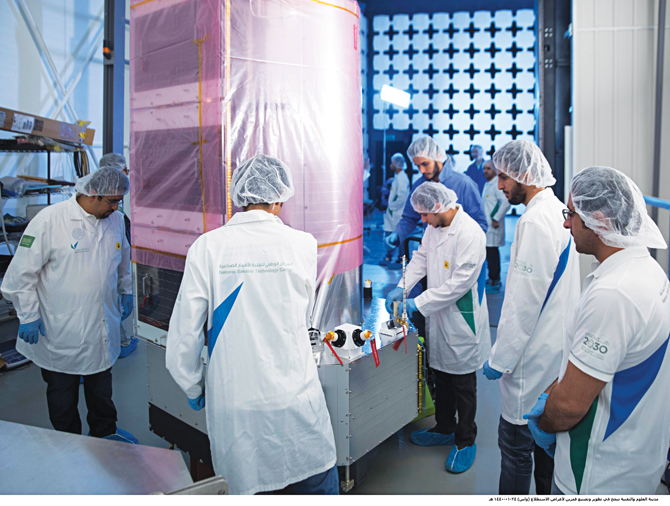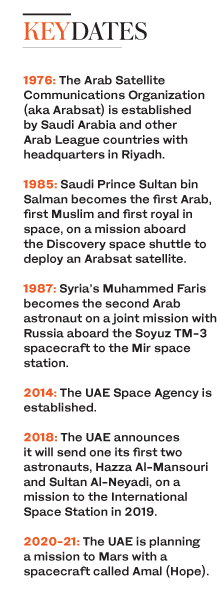DUBAI: Space enthusiasts and experts have planned more than 3,700 events in 80 countries to mark World Space Week, which begins and ends every year with two dates significant to the start of the first space age: On Oct. 4, 1957, the date Russia launched Sputnik 1, the world’s first satellite, and on Oct. 10, 1967, an international space treaty came into effect.
But as the world moves into the second space age, it won’t be long before the Middle East has its own set of milestones to mark.
Space science, mathematics, engineering and technology are increasingly gaining ground across the region. And although the call in 2008 to establish a pan-Arab space agency has not progressed as much as many had hoped, experts say the idea led to other positive developments, such as the establishment of the UAE Space Agency in 2014.
The UAE has quickly established itself as a global player on space-related matters, with other countries, such as Saudi Arabia, closely following suit.
“With the Kingdom announcing last year it is investing $1 billion in Virgin Galactic and its spinoff companies, it too is returning to reboot its now decades-old space program, that most notably had Sultan bin Salman Al-Saud, the first royal astronaut and the first Arab Muslim, to fly in outer space in 1985,” said Matthew Cochran, chairman of the Defense Services Marketing Council, an Abu Dhabi-based network of partnerships related to regional defense, space and security marketing. “The region is primarily dominated by the UAE Space Program, being the most relevant and mature in 2018 with its Mars mission and astronaut programs.”

Scientists at the King Abdulaziz City for Science and Technology in Riyadh have manufactured two space satellites so far. (SPA)
Last year, six countries – Saudi Arabia, Lebanon, Jordan, Morocco, Algeria and Bahrain – kicked off talks related to space. This year, Sudan, Oman and Kuwait joined the group. Cochran believes the main challenge facing the region is the constant requirement to travel outside the Middle East for relatively simple launches of CubeSats. “Having a launch capability for peaceful space programs from the UAE or the GCC is a must in the short term,” he said. “The space program in the UAE is vital as it provides the reach goals that combine all industries, governments and academic programs behind visionary goals. It also provides the velocity for the regional shifts as major players in the space and aerospace industry.”
He spoke of the UAE’s space program as a beacon of hope and prosperity for the planet as the human race strives to explore deep space with global partners. But more work needs to be done to achieve the ultimate goal of creating an Arab space agency.
“The Middle East, and particularly the UAE, is actively pursuing involvement in the space sector,” said Francesco Arneodo, associate dean of science and associate professor of physics at New York University – Abu Dhabi. “The progress has been very fast, with important initiatives like the ambitious Mars Mission, that foresees an orbiter around Mars in 2021, the establishment of the UAE Space Agency and the organization of international events.”
He said the agency is working on involving local and international institutes, including universities, research institutions and companies, to lay the foundations of a durable and productive space sector. 
“Access to space is often seen as a benchmark for the technological development of a country,” he said. “Putting a satellite in orbit nowadays costs much less than 10 to 20 years ago, and the diffusion of relatively cheap micro-satellites, among which the CubeSats – which are small, high-tech cubes of 10sqcm – offers an ideal platform for training and prototyping, a platform that is also becoming accessible to undergraduate students.
“However, if the goal is to establish a source of sustained innovation, and eventually of revenue, it should not be forgotten that this comes normally as the last step of a complex system that includes basic research that scientists do as an important element.”
And with the UAE’s plans to send the Arab world’s first mission to Mars through its Amal (Hope) probe by 2021, and Saudi working on developing satellite technologies for use in remote sensing and space communications, time is pressing. “It’s really exciting to see how fast the Middle East region is adopting space exploration activities,” said Bas Lansdorp, chief executive at Mars One in the Netherlands. “The world is becoming more and more aware that space is not just a great way to inspire, but also a business.”
As Gulf countries gradually shift their economies away from oil, building national capacity in the space sector can significantly contribute to meeting the countries’ missions. “The UAE’s government built the infrastructure and heavily invested in this sector as it will allow it to be a pioneer in this vital field,” said Dr Ahmed Murad, dean of the college of science at United Arab Emirates University. “Having the UAE Space Agency will help the country to structure and govern this sector in a proper way. The Emirates implemented the best practices in forming the agency.”

Prince Sultan bin Salman was the first Arab, Muslim and royal in space.
He said establishing a space agency in every country is crucial to lead the sector and further advance civilization. “This will help the region become the hub of advanced research in space while meeting the goals of the UAE’s Centennial 2071 project, for instance,” Dr Murad said. “The Middle East is advancing in adopting space and the sector has become a dream for every student. Different space-related entities have worked to pave the way to build state-of-the-art infrastructure that will help researchers conduct their work in issues and challenges associated with space.”
The region’s educational sector is also undergoing massive revamping to be able to adapt to changing times, with new and more focused curricula and programs focusing on science, technology, engineering, mathematics and space.
UAE University is no exception, with its physics department offering a new space science track this fall. Its college of science is also working on developing a minor in space science, which will be open to all students at the university. It is also working with other colleges to develop a graduate program in space science and technology.
“The main challenges that face the region will be limited to recruiting high-caliber researchers in the field of space in order to transfer the best practices of space to the region,” Dr Murad added. “Rapid developments in technology also pose challenges to the Middle East, but space is extremely important for regional countries because it is one of the main pillars that will help them diversify their economy in the long run.”













